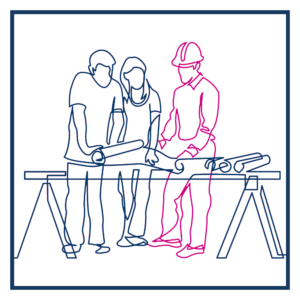We’ve recently teamed up with the London Progression Collaboration to bring you a series of content and webinars on the topic of apprenticeships.
Our first piece is from their Director, Anna Ambrose…
Like so many, the onset of Covid-19 made the London Progression Collaboration (LPC) question ourselves. It felt as though the bedrock gave way to quick-sands under our feet. Are we doing work that is important right now? Do we need to adapt our approach? What more can we do to meet the needs we see? By way of an introduction to the LPC, let me share with you how we answered those questions.
The London Progression Collaboration is a not-for-profit pilot initiative, testing a business support approach to increasing the number of apprenticeship opportunities available to low-paid Londoners. We exist to address two pressing challenges by supporting businesses to offer more apprenticeships. Firstly, the progression barriers experienced by those in low-paid work, who too frequently find it impossible to move into higher-quality employment. And secondly, the skills gaps cited as a key challenge by too many businesses. Apprenticeships are a way to address both of those challenges simultaneously.
As we entered lockdown in March 2020, and learned a whole new vocabulary of lockdowns and furlough, we wondered if apprenticeships were really as important as we’d previously thought. But it was rapidly clear that the reasons why the LPC exists and the challenges we’re working to address would only be exacerbated by the pandemic. As the impact on the labour market became clear, we saw that the groups we’re aiming to make a difference to are those at greatest risk of unemployment. If we believed in apprenticeships as a vital route for progression – the social justice imperative for our work if you like – then it had become even more important that we succeed.
As if to reinforce our commitment, in June the Social Mobility Commission reported that:
“…apprenticeships are one of the most effective means of boosting social mobility for workers from poorer backgrounds.”
What then of the skills gaps the LPC was created to address – our labour market imperative? Despite the shocking jolt from record high employment to an economy in recession and rapidly increasing unemployment, they were unchanged. The number of job seekers won’t fill digital or care sector skills gaps on its own; if the skills weren’t there before Covid-19, they won’t magically appear in its aftermath unless we do something to train people to fill those gaps.
Having reached those conclusions, in June we launched Reskilling the Recovery – a campaign asking London’s levy paying employers to pledge their unspent funds to support small businesses to survive, adapt to and recover from the pandemic. The £2.2 million in unspent funds pledged have enabled us to offer a levy-transfer service for London businesses, enabling the capital’s SMEs to access fully funded apprenticeship training.
With levy transfer requests totaling over £1.5m received to date, every apprenticeship created is an opportunity for a Londoner to build the skills they need to progress in work. The transfers that we have facilitated through Reskilling the Recovery have supported a range of London businesses to adapt to the new normal, from hospitality businesses upskilling their existing teams during lockdown to retail businesses increasing their digital capacity through digital apprenticeships. And we’ve supported care and construction businesses who wanted to give local young people skills and a job.
Apprenticeships have huge power for those who undertake them and for their employers. In the current climate, it’s more important than ever that we utilise them to their full potential. More than anything, in the midst of a global pandemic, it is a privilege for the LPC to be creating opportunities to get people into work and to build their skills in work, and to be helping businesses to get the skills they need.
Find out more at www.thelpc.uk/recovery






